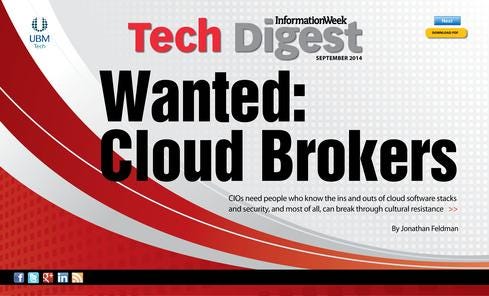Wanted: Cloud Brokers
Do you know the ins and outs of cloud software stacks and security? Got the finesse to break through cultural resistance? Then you may have found your next career.

 Download the entire new issue of InformationWeek Tech Digest, distributed in an all-digital format (free registration required).
Download the entire new issue of InformationWeek Tech Digest, distributed in an all-digital format (free registration required).
Jonathan Murray, executive VP and CTO of Warner Music Group, was in an enviable position. Warner management gave Murray a mandate: Take a blank sheet of paper and build the most optimal information technology model for the future. The result is what Murray calls the composable enterprise, a model that comprises resilient IT building blocks that can be shuffled to meet the needs of the business. Unsurprisingly, Murray is a big proponent of cloud, and there are convincing arguments that all but the largest organizations will eventually use public cloud infrastructure, often exclusively.
Today, however, is not that day. For now, most IT leaders must work hard to extract value from the public cloud -- many can't even calculate the business case. InformationWeek's Cloud ROI Survey of 392 business technology professionals shows just 14% have no cloud plans, down from 21% in 2012. But among those using infrastructure-as-a-service (IaaS), just 23% can accurately compare costs for computing infrastructure (servers and storage) delivered via public cloud versus in an on-premises data center. Price is a fundamental decision point, yet we can't even do apples-to-apples analysis. That missing financial analysis is a shame, because the cloud offers clear agility benefits. Spinning up five, 10, or 1,000 servers in a given quarter on a pay-as-you-go basis means no capacity planning onus on IT, and that when business initiatives wither, as they tend to do, you just stop paying rent instead of regretting capital investments.
To end this state of confusion, IT leaders should institute a cloud broker role to separate real reasons to avoid shipping services to a public cloud provider from those that are, frankly, just FUD.
When I see IT execs pick battles based on ginned-up issues, making statements like, "We do a better job with infrastructure security than any public cloud provider," and pointing to bogus third-party audits, I shake my head. You don't need to invent excuses, because there are areas where real complexity is holding back adoption. Most prominently, our incumbent enterprise software ain't ready for the cloud. Somewhere around zero ISVs explicitly support public cloud infrastructure today.
The grim reality is that your business partners have two main options for buying things like ERP and HR systems: rent software-as-a-service, or install Windows and SQL Server in your data center using VMware or Hyper-V and run on-premises licensed software on that infrastructure. You'll cause eyes to bug out if you mention running off-the-shelf software on Rackspace or Amazon Web Services, and you might bring on an aneurysm by requesting that a software vendor provide a deployment script for its app so that you can build and destroy cloud instances dynamically in platform-as-a-service or IaaS. There are clever startups that have created ways to work around this problem and wedge legacy enterprise software into a cloud model, but absent this type of software, it's anything but a slam dunk for IT system administrators.
As a result, a hybrid blend of private and public clouds has become the stock answer for how to build an enterprise cloud. There are purists who disagree, such as former Netflix architect Adrian Cockcroft, who stated at the 2014 InformationWeek Conference that "anybody who thinks that hybrid cloud is an endgame simply hasn't gotten into it yet."
Most arguments against hybrid can be deconstructed thusly: Hybrid adds complexity, and complexity is bad. As complexity increases, uptime decreases, security risk rises, operating costs (including head count to manage that complexity) trend up, along with mean time to repair. In short, everything good goes down, and everything bad goes up. Let's just keep life simple and do IT like we always have, right? Then we don't need cloud brokers.
But hybrid isn't necessarily a choice, and IT isn't necessarily in charge of the decision given the priorities and realities of the businesses we serve. Complexity is the rule, not the exception. IT must deeply understand cloud platforms and have a plan to broker an optimal balance between them and legacy systems based on capabilities, business needs, and costs.
CIOs need to know when a vendor -- or staffer -- is trying to pull a fast one. That means putting a brokerage practice in place.
Read the rest of the story in the new issue of
InformationWeek Tech Digest (free registration required).
About the Author
You May Also Like






